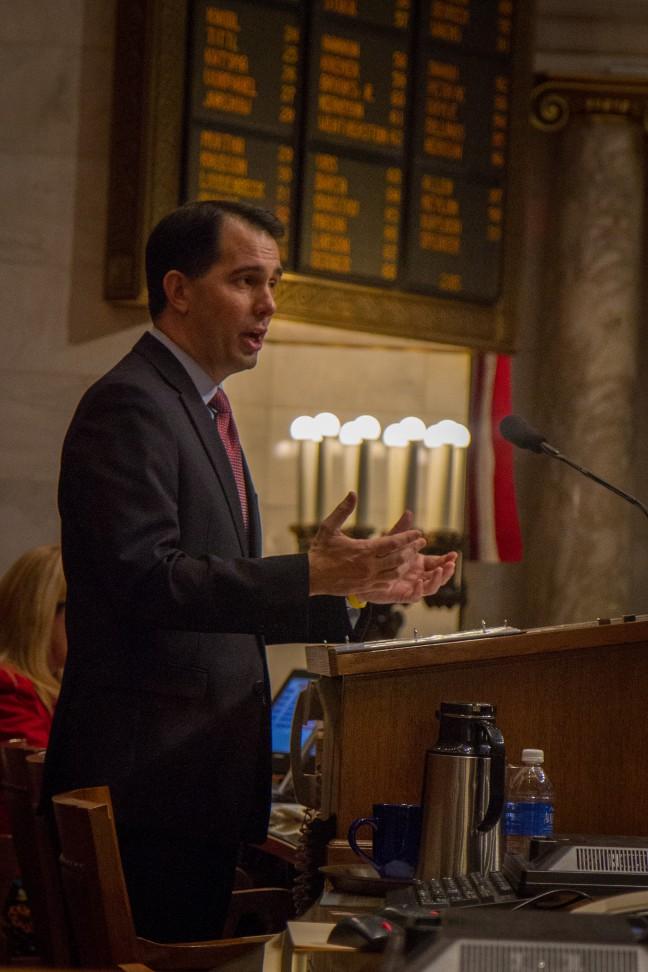Pundits from Madison to New York have written extensively about Gov. Scott Walker’s proposed budget and its effect on education in Wisconsin. While almost all of the columns universally question the wisdom of slashing the budget, they usually conclude that the moves are mostly posturing for a presidential run even if he isn’t officially a candidate yet. However, it is too soon to declare Walker’s proposal the law of the land, and many aspects relating to the University of Wisconsin may not come to pass. The public authority model is not a sure thing even with the support of the UW System Board of Regents and even the budget cuts are likely to be reduced.
It is crucial to understand the internal dissent among Republicans to understand the reservations about a public authority model. These reservations essentially boil down into two categories: concern over lack of tuition controls and the overall size of the cut. Sen. Steve Nass, R-Whitewater, a longtime UW critic, blasted Walker over allowing the regents to set tuition when the first public authority rumors surfaced. In recent weeks, Assembly Speaker Robin Vos, R-Rochester, and Walker have discussed instituting a permanent tuition cap to prevent UW from hiking up tuition rates in a few years when the tuition freeze expires. Whether the cap would be tied to inflation or some other metric has not been fleshed out yet, but the main point is clear – legislators don’t want to keep their fingers out of the UW pie.
Secondly, and personally a bit surprisingly, there is not uniform agreement over the size of the cuts. When the initial $300 million cut was announced, Vos along with Rep. Scott Krug, R-Rome, expressed concern over the size of the cut. Krug explicitly said he was not on board with the idea of cuts that large and that the impact on his constituency, UW-Stevens Point, would be too large to stomach. Vos questioned the wisdom of imposing all those cuts at the same time and the effects it would have on the smaller UW schools like River Falls, Whitewater or Platteville.
Despite the potential good news of a divided Republican caucus in regards to tuition and funding, keeping shared governance in the statute has not been discussed with the same public attention. The Associated Students of Madison, United Council of UW Students and student governments from around the state need to be prepared to act quickly in case 36.09(5), the statute outlining shared governance, is removed from state statutes. While the regents have said they would adopt shared governance and tenure as policy, students would do well to press for more secure assurances.
One potential method, and perhaps the cleanest strategy legally, is simply to present the regents with a legal contract asking them to implement 36.09(5) as if it were still statutory law. This contract would recognize student governments as official representatives of the student bodies and would need to have some form of legal recourse to protect against the regents disregarding the contract when it does not suit them. By framing the agreement as a legal contract, the regents would face repercussions for breaching the contract and would give students and faculty legal recourse in the event that they ignore student involvement.
This contract could also take the opportunity to clarify vague language or specify explicit oversight roles regarding “unallocable segregated fees” or the chancellor’s approval of all funding that is currently contentious. Unallocable segregated fees are by far the largest part of student segregated fees, but also the part with the least amount of student input. Additionally, the regents could clarify a method of creating official student governments that fit within the new contract. Right now, a student government can just start meeting and they would have shared government authority. These have all been happening in the dark for some time now, and bringing light to the process and making it clear for students and administration will benefit everyone.
Whether or not a public authority actually happens — and I’m inclined to believe it won’t — there is much to gain in regards to shared governance. These potential changes create an opportunity to clarify processes that have long needed clarification. Keeping up the fight for increased funding but expanding the scope to include new shared governance rules could solidify student authority in new and exciting ways.
Adam Johnson ([email protected]) is a Master’s candidate at the La Follette School of Public Affairs.














